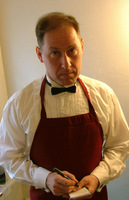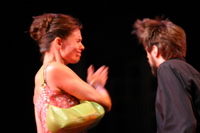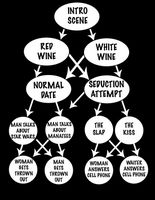On Adventures in Mating

Joe Scrimshaw describes his interactive stage drama, which with the exception of the technologies it employs, operates much like the computer-based interactive fiction Facade (discussed elsewhere in this thread). Rather than using code to select the proper reaction to user input as in Facade, the audience of Adventures in Mating votes on the choices the characters make, a la a Choose Your Own Adventure novel.
Adventures in Mating is an hour-long comedic play inspired by the Choose Your Own Adventure series of novels popular in the seventies and eighties. It was first performed as part of the Minnesota Fringe Festival in Summer 2005.
The show follows the social misadventures of a dysfunctional couple on a blind date and their dour waiter. When the couple comes to various decisions, such as white or red wine, the waiter steps forward and becomes the servant of the audience: he solicits their vote, through applause or a show of hands, and the action continues based on the audience decision. There is virtually no improvisation. A script exists for white wine or red wine.
There were many challenges translating the appeal of the CYOA novels into an hour-long romantic comedy. Stylistically, the show had to be somewhat believable as a blind date but the characters and situations had to be exaggerated to mirror the pulp-inspired feel of the novels. For example, if the audience votes for the man to go to the bathroom, he slips on a piece of lettuce and dies; the choice is then revisited with the death-inducing bathroom option removed. This satisfies the desire for the sudden “wrong turn” aspects of the novels, and on a practical level allows the show to stay on track and tell its story in under an hour.
The introductory scene needed to contain every bit of necessary exposition about the characters since it is the only scene that is guaranteed to be performed. Also, plenty of different ideas and themes needed to be established for the multiple divergent scenes and story arcs to explore.
Knowing a lot about the main character was not a concern of the CYOA novels, since they were written in the second person. This perspective is arguably the reason for the books’ popularity. It’s easy to invest in a choice about whether to jump out of a moving car, or to trust a stranger, if it’s all happening to you.
In Adventures in Mating the audience’s investment comes from playing the role of cruel fate. They are engrossed in a scene not only for its straightforward narrative content, but also for the ways the scene builds to another choice. For example, the audience enjoys watching the scene code-named “Seduction.” However, they are also elated when the woman announces that, if the man doesn’t stop wooing her, she will either kiss or slap him. The “cruel” part of the fate role is exemplified by the audience’s delight in controlling whether or not this living human being - separated from them only by a stage and the social constructs of traditional theater - is embraced by soft lips or repeatedly smacked across the face.
The nature of the show caused a great deal of anxiety for the performers. While the show is 95 percent scripted, there are moments of improvisation. This creates an odd hybrid for actors; Adventures in Mating is both a rigidly structured show requiring a lot of line memorization and a show that demands a lot of flexibility and improvisation. It is rare for a performer to have studiously rehearsed and memorized a script and still not know what will be performed on a given night. In its most recent incarnation, the show features fourteen distinct “viable” scenes as well as multiple “dead end” options (such as the aforementioned bathroom death scene). This adds up to well over fifty possible variations of the show, depending on the scene combinations.
For the waiter, the show does contain the potential for improvisation. The waiter must often respond to the zealous reactions of the audience’s voting; in the initial run of the show, actor Craig Johnson quickly developed a repertoire of admonitions such as, “Please. This is not a hootenanny.”
One scene also features a device called “The Cheeseburger Sequence,” which pokes fun at the structure of the show itself by generating a series of totally inconsequential decisions. The man on the date orders a cheeseburger and the waiter is forced to solicit votes from the audience regarding how well-done the burger is, what type of cheese, what type of bun, and even what side dishes. The audience consistently detected that this was a weak point in the marriage of script and improv, and would shout out odd comments, trying to force a reaction out of the waiter. For example, when the waiter delivers the scripted line, “Please don’t pick salad as a side dish - we have over fifteen dressings to choose from!”, the audience would demand salad because they accurately perceived that the waiter did not have a list of fifteen salad dressings memorized.
I would say that the show was successful aesthetically and critically, with some reservations. On the positive side, audiences enjoyed playing the role of fate. (Audiences in Minnesota are stereotypically considered to be quiet and reserved, yet they quite literally screamed in glee as they voted for something bad to happen. One published newspaper review described the audience as “mob-like,” and a blogger expressed disgust at his fellow audience members in a review titled, “Great actors, sadistic audience.”)
On the negative side, the effort put into giving the show a basic story arc, with a beginning, middle and end, no matter what combination of scenes were selected, backfired to some degree. The apparent fluidity of the show caused some audience members to doubt that alternate scenes and story arcs existed.
This suspicion was supported by the fact that some choices in the initial run were accidentally structured so that certain scenes were always selected. In the penultimate scene, the man receives a cell phone call from his ex-wife. The audience is offered the choice of whether the man should answer it (this receives a humorously small vote), the woman should answer (a healthy vote), or the waiter (an overwhelmingly large vote). The audience will simply always vote for the most illogical, conflict-oriented choice. In the show’s second run, the waiter had to warn audiences what the final outcome of the choices might be, in an attempt to randomize the audience’s selection.
In future drafts, I plan to experiment with a more geometric structure for the show; this would mean that each choice would be followed by two other choices. This may succeed in creating extremely distinct stories - or the volume of scenes may simply start to weaken the concept. Even an over-the-top pulp-inspired blind date can only have so many convolutions before the show crosses over into a realm of cartoonish absurdism, in which the couple is no longer real enough for the audience to care about their fate.
In any case, Adventures in Mating will continue to be developed with the goal of creating a long-running show that could play simultaneously in multiple cities; various story arcs could be switched in and out, thereby using the inherently modular nature of the show to keep itself fresh over time.
Reference
Scrimshaw, Joseph (2005). Adventures in Mating.
Cite this article
Scrimshaw, Joe. "On Adventures in Mating" Electronic Book Review, 18 April 2008, https://electronicbookreview.com/publications/on-adventures-in-mating/



